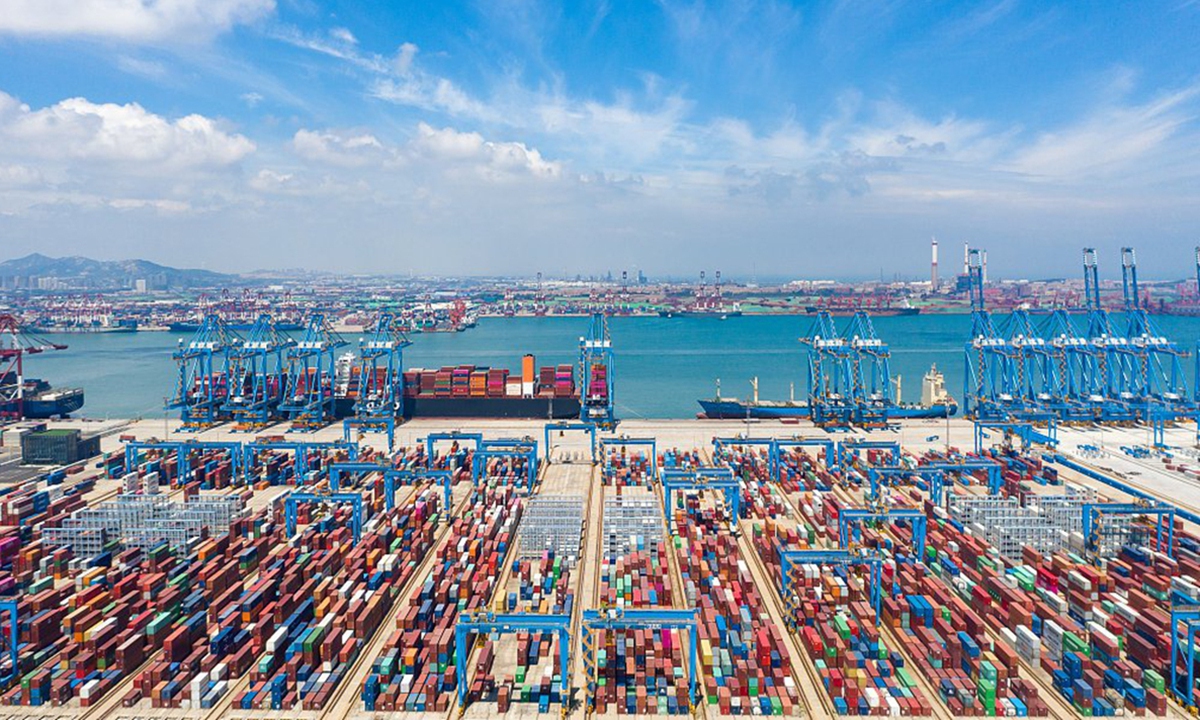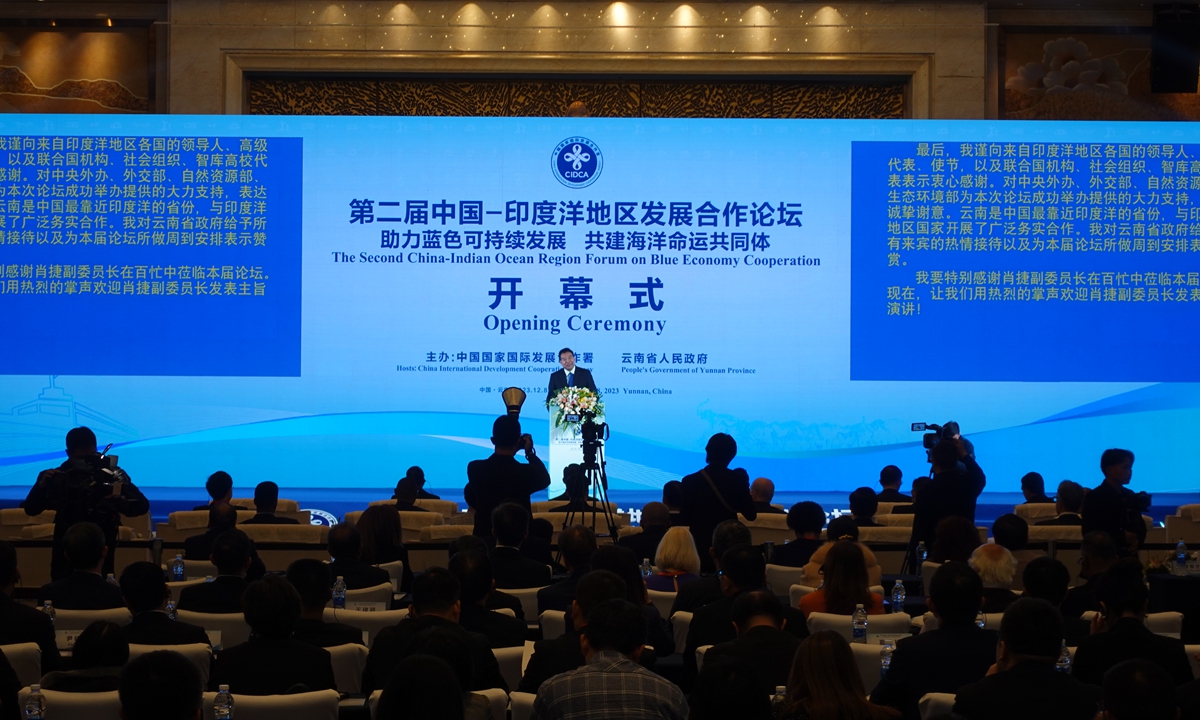China's top economic meeting outlines plan to tackle challenges, boost recovery in 2024

China trade economy File photo: VCG
At a key economic conference that concluded on Tuesday, top Chinese policymakers had outlined a slew of measures to tackle various challenges facing the Chinese economy, further promote and consolidate economic recovery and ensure effective improvement in quality and reasonable growth in quantity in 2024.
The tone-setting Central Economic Work Conference, held in Beijing from Monday to Tuesday, aimed to set priorities for economic work in 2024. Xi Jinping, general secretary of the Communist Party of China Central Committee, Chinese president and chairman of the Central Military Commission, delivered an important speech at the conference, according to the Xinhua News Agency.
While noting that China's economic recovery faces multiple challenges, the meeting stressed that favorable conditions for the Chinese economy outweigh unfavorable factors, and it called for enhanced confidence in China's economic recovery and long-term positive outlook.
Analysts noted that the meeting underscores Chinese policymakers' comprehensive and deep understanding of the challenges as well as opportunities the world's second-largest economy faces, and their unwavering commitment to address the challenges head-on and ensure improvement in both quality and quantity. Despite lingering downside risks, the measures will underpin steady recovery in 2024, and China will remain one of the fastest-growing major economies, they said.
The meeting reviewed China's economic work in 2023, studied the current economic situation and made plans for economic work in 2024. It noted that China's economy has achieved a recovery, with solid progress made in high-quality development in 2023.
To further revive its economy, China still has to overcome some difficulties and challenges, including lack of effective demand, lackluster social expectations, and rising complexity and the severity and uncertainty of the external environment, the meeting noted, urging enhanced awareness of the dangers and effectiveness in addressing them.
Still, "the favorable conditions facing China's development are stronger than the unfavorable ones, and the basic trend of economic recovery and long-term improvement has not changed," the meeting concluded.
For economic policies in 2024, the meeting reiterated the principle of seeking progress while maintaining stability, promoting stability through progress, and prioritizing development before addressing problems. It called for more policies that are conducive to stabilizing expectations, growth and employment.
"The meeting clearly indicates that in 2024, China will deploy a comprehensive set of fiscal and monetary policies to promote growth," Cao Heping, an economist at Peking University, told the Global Times on Tuesday. "If the intensity of the policies is appropriate, there is a solid foundation that we could even reach 5 percent growth [in 2024], which would be very impressive given the sheer size of our economy."
While the conference did not offer a clear growth target, which is usually released during the national two sessions to be held in March, there are growing expectations among Chinese economists and some global institutions that China's GDP growth could reach as much as 5 percent in 2024. Growth is widely expected to reach the officially announced target of around 5 percent this year.
Still, the meeting made it clear that the goal is to maintain "a reasonable growth in quantity." To that end, fiscal policies should be appropriately strengthened and prudent monetary policy should be flexible, appropriate, precise and effective, according to the meeting.
"Judging from the wording, in terms of fiscal and monetary policies, next year's focus will be on increasing the deficit, rather than opening the floodgates of stimulus, which is a goal to prevent and resolve risks," Cong Yi, a professor at the Tianjin University of Finance and Economics, told the Global Times on Tuesday.
Recent major policy moves indicate that China's will focus more on fiscal policy to support economic recovery. In October, officials announced a plan to issue an additional 1 trillion yuan ($137 billion) in treasury bonds, which brought China's fiscal deficit ratio to a historic level of 3.8 percent, compared to a 3 percent target. A target for 2024's deficit ratio is also expected to be released at the national two sessions.
"Fiscal policies still have room and the ability to offer support next year. So in terms of both policy and market operations, there are more positive factors next year and economic growth prospects and vitality will likely be better next year," Hu Qimu, a deputy secretary-general of the digital-real economies integration Forum 50, told the Global Times on Tuesday.
Hu said that against the backdrop of short-term challenges, the meeting offered a comprehensive plan for economic policies in 2024 and clear responses to issues that have drawn attention from the markets. "This really boosts confidence for next year because it helps form a relatively clear expectation for policies," he said.
Among the top priorities for economic work in 2024 is the call to continuously prevent and defuse risks in major areas, including the housing market, local government debt and small and medium-sized financial institutions, which have drawn great attention. Among other efforts, the meeting urged to address the reasonable financing needs of real estate companies with different ownerships equally.
As high-quality development remains a long-term top priority for China, the building of a modern industrial system through scientific and technological innovation is atop the economic agenda for 2024. The meeting highlighted various areas, including the digital economy and artificial intelligence.
"The importance of innovation in economic policymaking has not changed, as shown in the priorities [set by the meeting]," Hu said, noting that expanding domestic demand also remains at the top of China's economic work.
The meeting called for a slew of measures to expand domestic demand, including creating new ways of consumption, stabilizing and boosting consumption in new-energy vehicles and electronics, as well as giving full play to the role of government investment.
The meeting also called for reform of state-owned enterprises and increased support for the private sector. It urged efforts to expand high-level opening-up and consolidate the foundation of foreign trade and foreign investment, including removing obstacles for foreign nationals to come to China for business, study and tourism.



